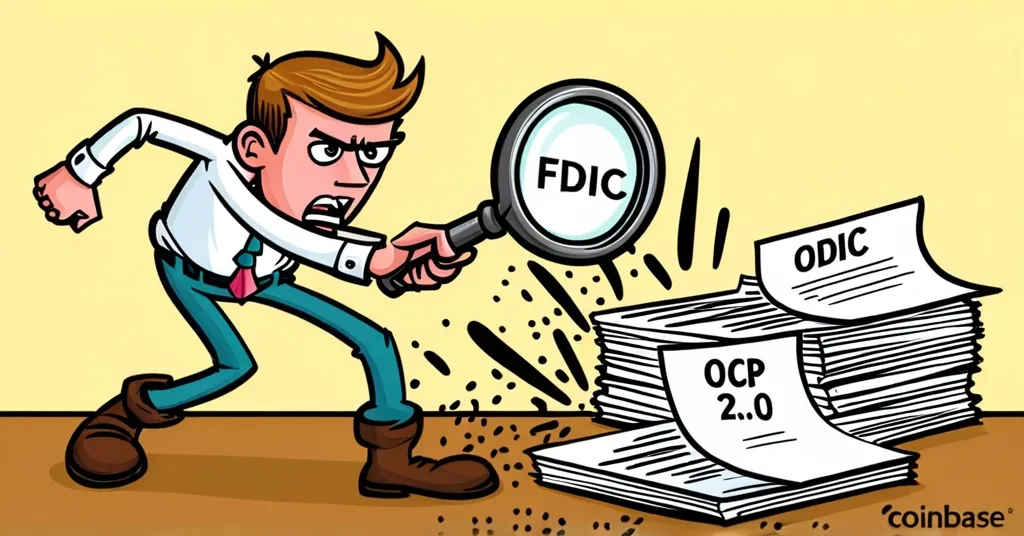Coinbase Exposes FDIC’s Role in Operation Chokepoint 2.0, Demands Congressional Probe

Coinbase Unveils FDIC’s Role in Operation Chokepoint 2.0: A Battle for Crypto Freedom
In a bold move, Coinbase Global Inc has successfully obtained unredacted documents from the Federal Deposit Insurance Corporation (FDIC), exposing the agency’s involvement in Operation Chokepoint 2.0, a coordinated effort to restrict cryptocurrency activities.
- Coinbase obtains unredacted FDIC documents
- Documents reveal FDIC’s role in Operation Chokepoint 2.0
- Paul Grewal criticizes FDIC’s compliance and credibility
- Calls for new Congressional investigation
Coinbase’s legal team didn’t just knock politely—they barged in with a court order in hand, demanding the FDIC reveal what they’ve been up to. The FDIC, tasked with insuring bank deposits and overseeing banks, has been caught red-handed in Operation Chokepoint 2.0, an initiative that’s been quietly trying to choke out the crypto industry’s growth.
Coinbase’s Victory in Court
After a legal tussle that could rival any courtroom drama, Coinbase managed to pry these documents from the FDIC’s grasp. The FDIC initially handed over redacted versions, but Coinbase wasn’t satisfied with half-truths. They demanded the full story, and thanks to a court order, they got it. The FDIC, a government agency that’s supposed to be all about transparency and consumer protection, found itself in the hot seat, scrambling to comply.
The FDIC’s Role in Operation Chokepoint 2.0
What did these documents reveal? A coordinated effort by the FDIC to stop everything from simple Bitcoin transactions to more complex crypto offerings. Operation Chokepoint 2.0 is the sequel to the original Operation Chokepoint from 2013-2017, which used the concept of “reputational risk” to pressure banks into severing ties with certain businesses, including those in the cryptocurrency sector. The FDIC’s tactics in this new operation? Urging banks to hit pause on crypto-related services, all in the name of regulatory reviews.
Paul Grewal’s Critique
Paul Grewal, Coinbase’s Chief Legal Officer, didn’t pull any punches when he saw what the FDIC was up to. “We finally got the unredacted OCP 2.0 letters from FDICgov,” he declared. “It took a Court order but you can now read them for yourself below. They show a coordinated effort to stop a wide variety of crypto activity—everything from basic BTC transactions to more complex offerings.” His frustration was palpable, especially after the FDIC initially claimed full cooperation, only to find additional ‘pause letters’ later on. “It is hard to believe in their ‘good faith’ as their actions seem inconsistent and their credibility is undermined with each new discovery,” Grewal remarked, throwing shade at the FDIC’s so-called transparency.
“We finally got the unredacted OCP 2.0 letters from FDICgov. It took a Court order but you can now read them for yourself below. They show a coordinated effort to stop a wide variety of crypto activity—everything from basic BTC transactions to more complex offerings.” – Paul Grewal
“It is hard to believe in their ‘good faith’ as their actions seem inconsistent and their credibility is undermined with each new discovery.” – Paul Grewal
Implications for the Crypto Industry
The crypto industry is all about innovation and disruption, but regulatory overreach could put a damper on that. The FDIC’s actions, if left unchecked, could hinder the adoption of cryptocurrencies and limit their potential to revolutionize financial systems. Grewal’s call for a Congressional investigation is a crucial step towards ensuring that regulatory practices remain transparent and accountable. “The new Congress should launch hearings on all this without delay,” he urged, emphasizing the urgency of the situation.
“The new Congress should launch hearings on all this without delay, suggesting a thorough investigation into the matter.” – Paul Grewal
Historical Context and Future Steps
Operation Chokepoint 1.0 targeted industries like payday lending and firearms, using “reputational risk” as a cudgel. Fast forward to now, and Operation Chokepoint 2.0 is taking aim at cryptocurrencies. While Coinbase’s victory is a win for transparency, it’s just the opening act. The crypto community must stay vigilant and keep pushing for regulatory practices that foster growth and innovation, not stifle it. If the FDIC thinks they can choke out crypto, they’re in for a rude awakening. This is just the beginning of the pushback.
Counterpoints and Perspectives
It’s worth considering the FDIC’s perspective, though. They might argue that their actions are necessary to protect consumers from the risks associated with cryptocurrencies. However, this argument falls flat when you consider the lack of transparency and due process in their methods. The use of Confidential Supervisory Information (CSI) protections to keep their supervisory scrutiny under wraps has been a point of contention for years. It’s time for a more open and accountable approach to regulation.
Key Takeaways and Questions
- What did Coinbase obtain from the FDIC?
Coinbase obtained unredacted documents related to Operation Chokepoint 2.0 from the FDIC after a court order.
- How did Paul Grewal describe the FDIC’s actions?
Paul Grewal described the FDIC’s actions as inconsistent and undermining their credibility, especially after they found additional ‘pause letters’ post their initial claim of full compliance.
- What did Paul Grewal suggest should be done following the document release?
Paul Grewal suggested that the new Congress should launch hearings and conduct a thorough investigation into the FDIC’s actions.
- What is Operation Chokepoint 2.0?
Operation Chokepoint 2.0 is an alleged coordinated effort by U.S. regulatory agencies to restrict a wide range of cryptocurrency activities.
- Why was a court order necessary?
A court order was necessary because the FDIC initially released redacted versions of the documents, and Coinbase needed the unredacted versions to fully understand the FDIC’s actions regarding Operation Chokepoint 2.0.
As we navigate this complex landscape, one thing remains clear: the battle between the crypto industry and regulatory bodies is far from over. Coinbase’s success in obtaining these documents is a victory for transparency, but it’s just the beginning. The crypto community must remain vigilant and continue to push for fair and open regulatory practices that allow for the continued growth and innovation of this revolutionary technology. While this is a victory for transparency, the fight for crypto freedom is far from over.



